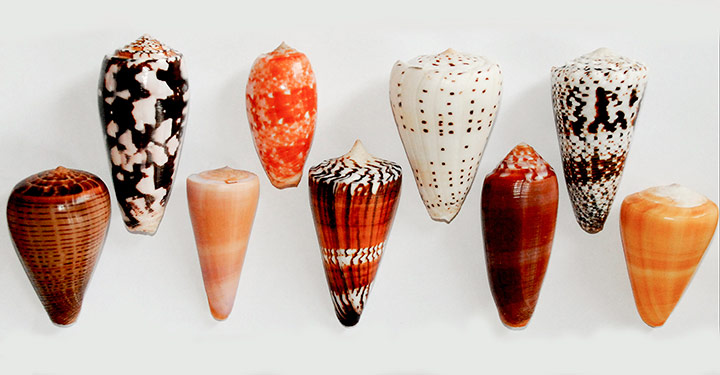Cone snails: a powerful biomedical resource at risk of extinction
Posted on 6 January 2015
Marine cone snails, valued for centuries for the intricate patterns on their shells, now have a leading role in efforts to tackle some of our most serious life-threatening diseases.

Cone snails manufacture powerful venom to immobilise their prey of fish, worms and other snails.”
But a study by a research team from our Department of Environment and Geography shows that some species are under threat of extinction – and their loss could rob future generations of an, as yet, an undiscovered reservoir of pharmaceuticals.
Powerful venom
Cone snails live in warm tropical seas and manufacture powerful venom to immobilise their prey of fish, worms and other molluscs. Scientists are using these neurotoxins, some powerful enough to kill people, as the basis for research into the development of life-saving drugs for medical conditions including intense chronic pain, epilepsy, asthma and multiple sclerosis.
Across the world, however, tropical marine habitats are being lost due to coastal development, pollution, destructive fishing and climate change, resulting in rapid species loss. A recent global assessment of 632 species of cone snails for the International Union for the Conservation of Nature (IUCN) Red List by our researchers found that some species are at imminent risk of extinction.
The study found an almost complete lack of protection for cone snails anywhere in the world.
Lead author, Dr Howard Peters, of the Department of Environment and Geography, said: “Cone snails are seeing rapid shrinkage of their habitats as human impacts multiply. We found that 67 species are currently threatened or near-threatened with extinction worldwide, but this rises to nearly half of all species (42) in the Eastern Atlantic, where there is an exceptional concentration of range-restricted species.”
Extraordinary beauty
He added: “Despite their extraordinary beauty and value, cone snails have fallen completely underneath the conservation radar. These snails need swift action to protect their habitats and publicise the dire consequences of irresponsible shell collecting of the most threatened species. Holidaymakers need to think twice before taking a seashell home as a souvenir.”
Co-author Professor Callum Roberts added: “This study provides an important yardstick from which to measure our growing impact on molluscs, one of the richest groups in the sea, and the long-term consequences of ocean acidification. Ocean acidity is increasing due to fossil fuel burning as carbon dioxide dissolves in the sea. Without action to reduce emissions, rising acidification could cause shelled marine creatures to literally dissolve away by the end of this century.”
The research was published in PLOS ONE.
The text of this article is licensed under a Creative Commons Licence. You're free to republish it, as long as you link back to this page and credit us.

Callum Roberts
Research Title: Professor of Marine Conservation in the Department of Environment and Geography
Marine conservation biologist whose research focuses on the impact of humans on marine ecosystems.
Discover the details
Find out more in the York Research Database and beyond
Article
- Conus: First Comprehensive Conservation Red List Assessment of a Marine Gastropod Mollusc Genus (plosone.org)
Visit the department
Explore more research

A research project needed to spot trees on historic ordnance survey maps, so colleagues in computer science found a solution.

We’re using gaming technology to ensure prospective teachers are fully prepared for their careers.

A low cost, high-accuracy device, could play a large part in the NHS's 'virtual wards'.
